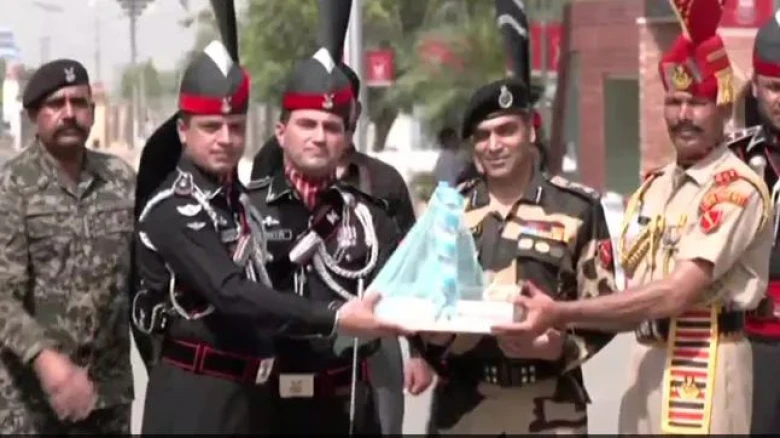International

Digital Desk:
On
the occasion of Eid ul-Adha, Pakistan Rangers and the Border Security Force
(BSF) swapped sweets on Sunday along the Attari-Wagah border.
Jasbir Singh, the BSF
Commandant, stated, "At the Joint Check Post (JCP) Attari Border, BSF
presented treats to Pakistan Rangers in honour of Eid ul-Adha. This handshake
between two border patrolling personnel is customary. This represents our
tradition, goodwill, and peace as well."
The holy event known as
the "festival of sacrifice" is called Eid ul-Adha or Bakra Eid, and
it is commemorated on July 10 this year. It takes place on the tenth day of Dhu
al-Hijjah, the 12th month of the Islamic or lunar calendar. It signals the
conclusion of the yearly Hajj trip.
Based on the Islamic
lunar calendar, which is around 11 days shorter than the 365-day Gregorian
calendar used in the West, the date varies every year.
When individuals gather
with their families to celebrate Eid ul-Adha, they let go of old resentments
and forge deep bonds with one another. It is observed to remember Prophet
Abraham's readiness to give up all for God.
When Allah appeared to
Prophet Abraham in a dream 4,000 years ago, He instructed him to give up the
thing he treasured most.
According to mythology,
the Prophet was going to offer his son Isaac as a sacrifice when an angel
intervened and stopped him. He was informed that because God was sure of his
love for him, he might make another thing as a "huge sacrifice."
Jews and Christians are
both familiar with the same story that is told in the Bible. Muslims think the
son was Ishmael rather than Isaac as described in the Old Testament, which is a
significant distinction. Ishmael is revered in Islam as a prophet and
Muhammad's ancestor.
Muslims commemorate this
day by offering a symbolic sacrifice of a lamb, goat, cow, camel, or other
animal, which is then divided into three parts and distributed equally among
family, friends, and the less fortunate.
Worldwide, there are
many various Eid customs and celebrations, and each nation observes this
significant holiday in a distinctively cultural way. Muslims in India dress
newly and participate in outdoor prayer gatherings. They would sacrifice a
sheep or a goat and give the meat to the impoverished, their neighbours, and
family members.
On this day, many meals are consumed,
including mutton biryani, Ghosht Haleem, Shami Kebab, and mutton korma, as well
as desserts like kheer and Sheer Khurma. Giving to the less fortunate is seen
as an essential component of Eid ul-Adha.
Leave A Comment